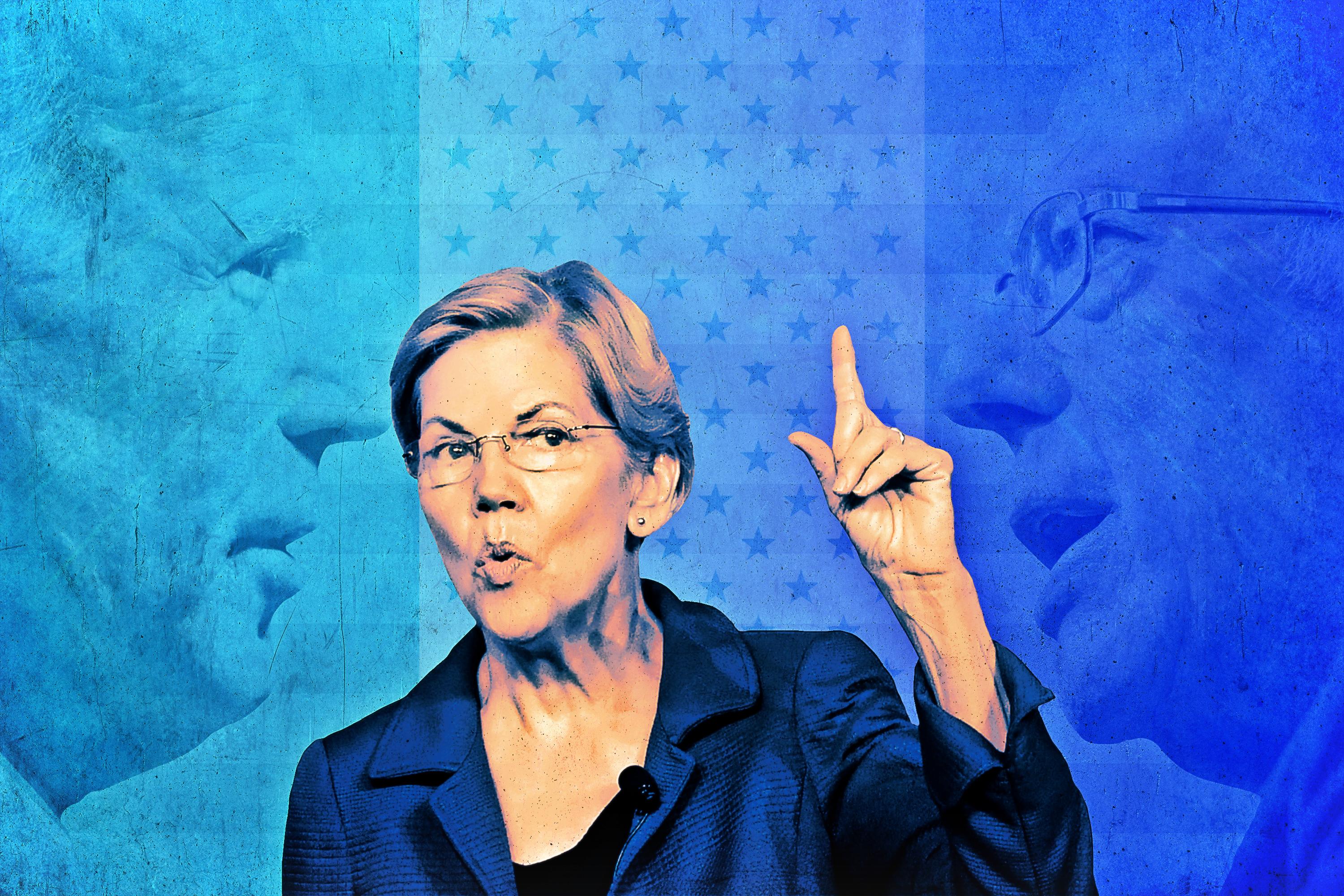
Last week, The Verge published a transcript of a leaked recording from two July company-wide Q&As at Facebook with CEO Mark Zuckerberg. An employee asked Zuckerberg about “the rise of politicians like Sen. [Elizabeth] Warren” and the prospect, under a Warren administration, of “regulators coming in and breaking up Facebook.” It was the first question, and the most pressing one for the company as Warren, a Democratic presidential hopeful, campaigns on a provocative promise. “Nearly half of all e-commerce goes through Amazon. More than 70 percent of all Internet traffic goes through sites owned or operated by Google or Facebook,” Warren wrote in one Medium post. “To restore the balance of power in our democracy, to promote competition, and to ensure that the next generation of technology innovation is as vibrant as the last, it’s time to break up our biggest tech companies.” The pledge pits the embattled tech-monopolist Zuckerberg against the next decade’s aspiring trustbuster, Warren.
Warren and Zuckerberg have clashed throughout the presidential campaign season. In March, Facebook removed from its platform several native advertisements paid for by Warren’s campaign that read: “Three companies have vast power over our economy and our democracy. Facebook, Amazon, and Google. We all use them. But in their rise to power, they’ve bulldozed competition, used our private information for profit, and tilted the playing field in their favor.” Facebook explained that the ads were flagged for appropriating the company’s logo without permission, but they quickly restored them “in the interest of allowing robust debate.” Internally, Zuckerberg responded to Warren’s criticisms with a monopolist’s classic combativeness. “If she gets elected president, then I would bet that we will have a legal challenge, and I would bet that we will win the legal challenge,” Zuckerberg said in the Q&A. “If someone’s going to try to threaten something that existential, you go to the mat and you fight.”
It’s curious to hear Zuckerberg and his employees expressing so much anxiety about “the rise of politicians like Sen. Warren,” rather than Vermont Senator Bernie Sanders, who commands a greater share of public support in the 2020 Democratic presidential primary and similarly antagonizes Silicon Valley. The rise of democratic socialist politicians like Sanders suddenly seems limited to the 2016 Democratic presidential primaries and the 2018 midterm elections, which promoted Sanders’s allies, chiefly, freshman New York Representative Alexandria Ocasio-Cortez. In the presidential race, Sanders is losing ground to Warren, who disavows socialism while adapting its rhetoric and its significance as a popular left-wing shift against Trumpism.
Warren’s rise in the primary—she enjoys 21 percent among Democratic voters in the most recent polls—defies so many foundational concerns about her electability. In theory, Warren might prove too progressive, as a happily confiscatory technocrat, to please former vice president Joe Biden’s center-left partisan support; too explicitly wedded to capitalism to please Sanders’s supporters; and too dry, as a fin-reg expert, to launch a quasi-populist revolution of her own. Warren has struggled in polls that show most self-identified Biden voters listing Sanders as their second choice for the nomination, and vice versa. Alternatively, Warren has siphoned support from a dozen other candidates, including New Jersey Senator Cory Booker and California Senator Kamala Harris, who have each languished below 5 percentage points in most polls. Warren is polling well enough in New Hampshire and Iowa to prove her electability, as Barack Obama did eight years ago, with an upset in one of the caucuses.
Sanders’s and Biden’s campaigns have faltered for reasons unattributable to Warren. Biden has been implicated in the Ukraine scandal, which mostly endangers President Donald Trump, but may well come to resemble the U.S. State Department email scandal, which haunted Hillary Clinton’s 2016 presidential campaign. Sanders has canceled several campaign stops after having a heart procedure last week. Both men suffer concerns about their advanced age—Biden is 76 years old; Sanders is 78. Julián Castro went so far as to ridicule Biden’s short-term memory in the most recent debate. Though Warren is only six years younger than Biden, her campaign takes great care to demonstrate Warren’s physical vitality on the campaign trail: She’s always jogging. (Sanders plays baseball, a sport that, if anything, makes any player look older than they really are.) Warren’s challenge is to split the difference between Biden and Sanders in the primary while causing minimal acrimony about the nomination among Democratic voters.
Gradually, Warren has endeared herself to a critical faction: Democrats who have drifted leftward during Trump’s presidency while remaining wary about Sanders. For many pundits, Sanders peaks as a revolutionary figure whose political power begins and ends by inspiring someone else to win the presidency—but not him. Sanders and Warren often echo each other’s viewpoints and speak encouragingly about each other in interviews, speeches, and debates. But the general anti-Trump camaraderie among Democratic presidential candidates shows signs of disintegrating. Former Texas representative Beto O’Rourke has clashed with South Bend Mayor Pete Buttigieg over gun control; Minnesota Senator Amy Klobuchar belittles the other senators over their commitment to massive left-wing programs, such as Medicare for All and the Green New Deal; and Warren, on the rise, confronts two front-runners, Sanders and Biden, who have each seen their poll numbers drop.
Ultimately, Warren means to confront Trump, who has ridiculed Warren more doggedly than he’s ridiculed any other Democratic presidential candidate since Hillary Clinton. Trump may not fear Warren, but clearly, Zuckerberg does. Still, every other billionaire in Silicon Valley is slowly opening their checkbooks to help advance her insurgent campaign: better Warren than a socialist or a stranger, they suppose. But Warren has become the most credible threat to the monopolistic power of Facebook, Google, and Amazon. The rest of Silicon Valley may well succumb to her insurgency as Zuckerberg goes down swinging.

